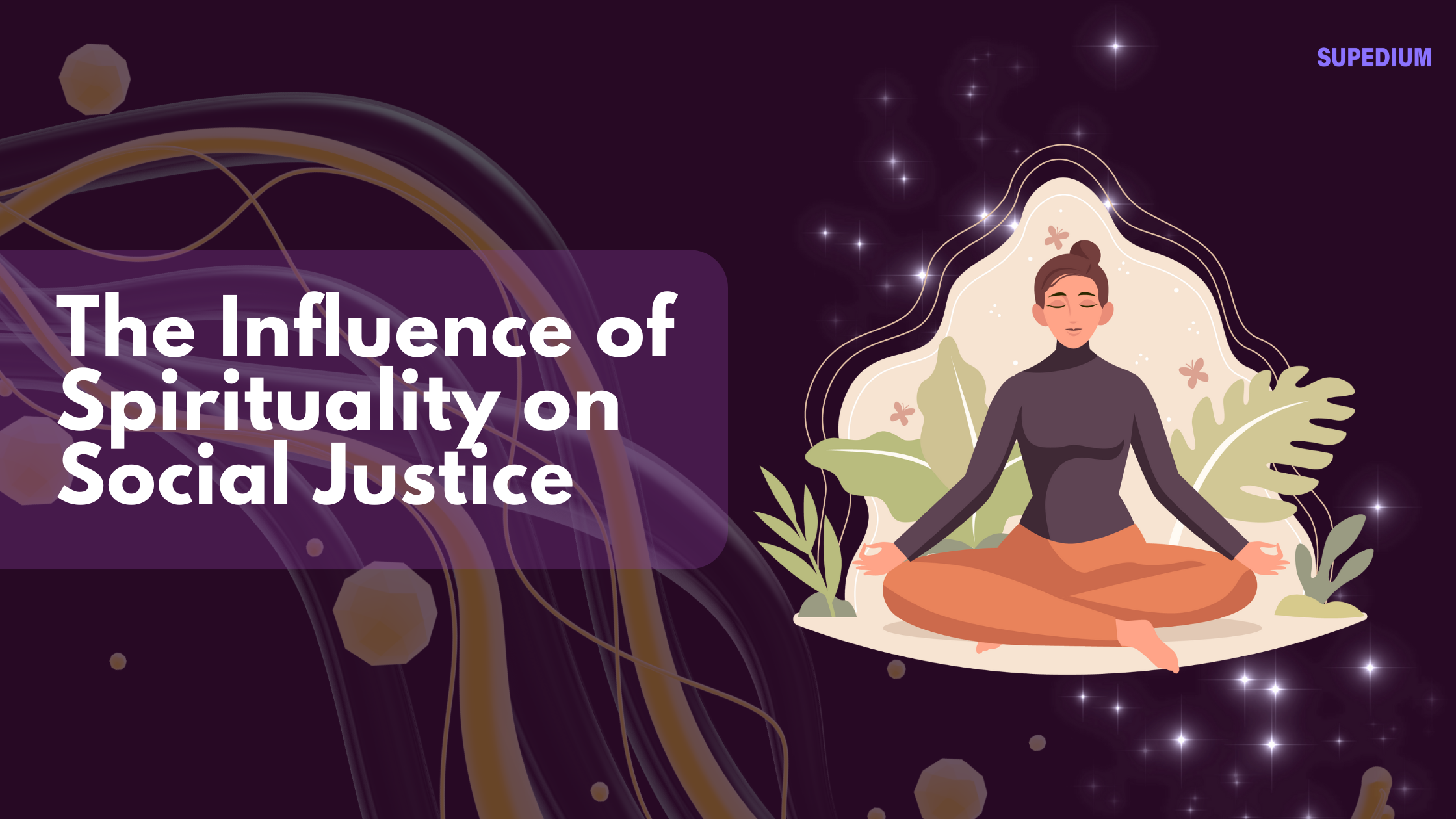Table of Contents
![]()
Introduction
Spirituality and social justice are concepts that often intersect in profound and meaningful ways. Spirituality, generally understood as a personal or collective pursuit of transcendent meaning, values, or connection, can significantly shape how individuals and communities perceive and act upon issues of social justice. Social justice, which revolves around fairness, equality, and the equitable distribution of resources and opportunities, is influenced by a myriad of factors, including spiritual beliefs and practices. This article explores the historical, theoretical, and practical intersections between spirituality and social justice, examining how spiritual perspectives and actions contribute to societal progress.
Historical Context
Spirituality and Social Justice in Ancient Traditions
In ancient traditions, spirituality and social justice were often intertwined. For instance, Hinduism’s concept of Dharma emphasized righteous living and social order, which had implications for justice and ethical behavior. Similarly, Buddhism’s teachings on compassion and non-violence, or Ahimsa, contributed to social norms that promote fairness and equity.
In the Western context, Stoicism, an ancient Greek philosophy, advocated for the cultivation of virtue and moral integrity, which indirectly supported social justice by encouraging individuals to act justly. Early Christianity also played a role in shaping social norms, with teachings of love, charity, and care for the marginalized influencing early social practices.
Medieval and Renaissance Influences
During the medieval period, figures such as St. Francis of Assisi exemplified how spiritual beliefs could drive social change. His commitment to poverty and service reflected a deep concern for social equity and justice. The Renaissance continued this trend, with spiritual leaders advocating for reforms and ethical behavior that impacted social structures.
Modern Historical Developments
The Enlightenment era saw a shift towards secularism, which impacted the direct link between spirituality and social justice. However, spiritual social justice movements emerged in the 19th and 20th centuries. For example, the Civil Rights Movement in the United States was deeply influenced by Christian spiritual values, with leaders like Martin Luther King Jr. drawing on his Christian faith to advocate for racial equality and justice.
Theoretical Framework
Philosophical Perspectives
Philosophical theories often explore the connection between spirituality and social justice. Liberation theology, for instance, emerged as a Christian movement emphasizing the need for social and economic justice, interpreting spiritual teachings as a mandate to address systemic inequalities. The social gospel, similarly, linked Christian teachings with social reform efforts, advocating for justice and equality.
Comparing secular and spiritual approaches reveals different motivations for justice. While secular approaches might focus on humanistic or utilitarian principles, spiritual approaches often emphasize moral and ethical imperatives derived from religious or philosophical teachings.
Psychological and Sociological Perspectives
From a psychological perspective, spirituality can influence values and behavior. Spiritual beliefs often foster a sense of purpose and ethical responsibility, which can translate into social action and community involvement. Sociologically, spiritual communities often engage in collective efforts to address social issues, driven by shared values and a sense of collective responsibility.
Spiritual Traditions and Social Justice
Christianity
Christianity has a long history of engagement with social justice. The Catholic Church, for example, has historically been involved in various social justice causes, including education, healthcare, and poverty alleviation. Contemporary movements within Christianity, such as progressive Christianity, continue to advocate for social justice, addressing issues like income inequality and racial discrimination through a spiritual lens.
Islam
Islamic teachings on social justice are rooted in concepts such as Zakat (charity) and justice. Historically, early Islamic caliphates implemented social welfare systems and legal reforms promoting equity. Modern Islamic social justice initiatives, such as charitable organizations and advocacy groups, continue to address contemporary social issues, including poverty and human rights.
Judaism
Judaism’s principle of Tikkun Olam, or “repairing the world,” reflects a commitment to social justice. Jewish teachings emphasize ethical behavior, justice, and community service. Contemporary Jewish organizations, such as Jewish Voice for Peace, work on social justice issues, advocating for peace, equality, and human rights.
Hinduism
Hinduism’s concept of Dharma, or duty, includes a moral obligation to act justly and support social order. Modern Hindu movements, such as those addressing caste discrimination, reflect an ongoing commitment to social justice. Efforts to promote equality and social reform are rooted in spiritual teachings about righteousness and equity.
Buddhism
Buddhism’s principles of compassion (Karuna) and non-violence (Ahimsa) have significant implications for social justice. Engaged Buddhism, a contemporary movement, applies Buddhist teachings to social and environmental issues, advocating for justice, peace, and ethical behavior.
Indigenous Spiritualities
Indigenous spiritualities often emphasize community cohesion, respect for nature, and social harmony. Indigenous-led social justice movements frequently draw on spiritual principles to advocate for rights, environmental protection, and cultural preservation.
Case Studies
Historical Figures
Mahatma Gandhi’s integration of spirituality and social justice is a prominent example. His philosophy of non-violent resistance, influenced by his Hindu beliefs, was instrumental in the Indian independence movement and has inspired global social justice efforts.
Martin Luther King Jr. also exemplified the influence of spirituality on social justice. His Christian faith motivated his leadership in the Civil Rights Movement, advocating for racial equality and justice through non-violent protest and moral persuasion.
Contemporary Movements
Modern social justice movements increasingly reflect a blend of spiritual and secular approaches. The Black Lives Matter movement, for example, includes spiritual elements in its advocacy for racial justice, with many leaders and supporters drawing on faith-based principles to guide their activism. Similarly, climate justice movements often incorporate spiritual values, emphasizing stewardship of the Earth as a moral responsibility.
Challenges and Criticisms
Potential Conflicts
There are potential conflicts between spiritual and secular approaches to social justice. Spiritual perspectives may sometimes be at odds with secular methodologies or policies, leading to disagreements on the best way to address social issues. Additionally, differences within spiritual traditions regarding social justice can create tensions and hinder unified action.
Criticisms of Spiritual Approaches
Critics argue that spiritual approaches to social justice can sometimes be escapist or insufficiently focused on systemic change. Concerns include the potential for spiritual elitism or exclusion, where certain groups may use spirituality to justify or perpetuate inequalities rather than addressing them.
The Future of Spirituality and Social Justice
Emerging Trends
The intersection of global spirituality and social justice is becoming increasingly prominent. New spiritual movements and practices continue to address contemporary issues such as climate change, inequality, and human rights. These emerging trends reflect a growing recognition of the role that spirituality can play in promoting social justice on a global scale.
Opportunities for Collaboration
There is significant potential for collaboration between spiritual and secular social justice initiatives. By integrating spiritual values with secular strategies, it is possible to create more comprehensive and effective approaches to addressing social issues. Fostering dialogue and cooperation between different perspectives can enhance the impact of social justice efforts.
Conclusion
The influence of spirituality on social justice is both profound and multifaceted. Spiritual beliefs and practices have historically shaped and continue to influence social justice initiatives, contributing to the pursuit of equity and fairness. By examining historical examples, theoretical frameworks, and contemporary movements, it is clear that spirituality can play a crucial role in advancing social justice. As we move forward, integrating spiritual values with social justice efforts offers a promising path toward creating a more just and equitable world.
Share This





Be the first to comment